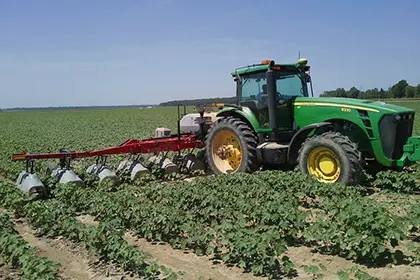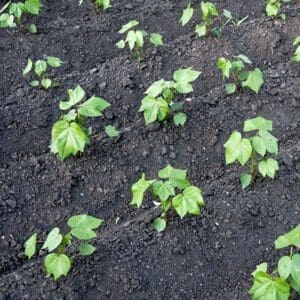
Tackle Weeds with a Proactive Approach
“The first approach I take to customizing a plan is understanding how the grower likes to run their operation. Do they take a no-till approach or use some tillage, or do they rely more on deep breaking and heavy tillage?” said Wilbur-Ellis sales representative, Nathan Foster.
Using conventional tilling techniques or strip-tilling can control weeds without the use of chemicals and works well for some growers. However, the current, high price of diesel can make this method cost the same as chemical applications. So, it’s important to find the most cost-effective approach for each grower.
The heavy reliance on dicamba to control Palmer amaranth and other pigweeds and the subsequent development of resistance has spiked a resurgence in hooded sprayers. Hoods provide more flexibility to use other modes of action and maintain a no-till or limited-till operation.
The power of traits
 According to Foster, one of the strongest tools to help combat weeds is stack-trait herbicide-resistant seed technology. XtendiMax®* dicamba-resistant cotton seed was a major factor in decreasing glyphosate use. While this trait was not a silver bullet for weed management, it gave researchers time to develop new solutions.
According to Foster, one of the strongest tools to help combat weeds is stack-trait herbicide-resistant seed technology. XtendiMax®* dicamba-resistant cotton seed was a major factor in decreasing glyphosate use. While this trait was not a silver bullet for weed management, it gave researchers time to develop new solutions.
The next big thing in seed traits from BASF will offer cotton that is resistant to glyphosate, glufosinate, dicamba and newly developed HPPD inhibitors. The Axant™ Flex* technology gives growers more choices for pre- and post-emergent herbicide applications and should be available soon.
“Once Axant™ comes out, the amount of dicamba that is sprayed will really decrease, and we will rely on that new technology. It is something that’s coming down the pipeline that we’re really looking forward to as a tool against resistance,” said Foster.
Foster works with the growers in his area to determine the return on investment they can expect with stacked-trait crop genetics.
“Before cotton had herbicide tolerance traits the cost was below $100 a bag. Now with these fully stacked cotton varieties, the cost will be more than $500 a bag. Growers need to understand that new technology comes with an increased cost, so we’re going to have to weigh out costs versus yields and see if it’s worth it,” explained Foster.
Drought impacts on weed management
Extreme drought conditions in the past few years have added an extra challenge to controlling resistant weeds. Less rain means that growers haven’t had to deal with as much weed pressure in their cotton fields, but the extremely dry conditions also mean fields have been left fallow. Fields that were left untouched grew large amounts of kochia and Russian thistle, among other weeds, refilling the weed seed bed. In areas receiving spring rains, these weeds have already begun to sprout.
“We are going to be relying on 2,4-D and flumioxazin early this season before we even plant cotton to knock back that weed pressure,” said Foster.
Be proactive, not reactive
 Not all herbicides work on every kind of weed, but by staying active in the fields and scouting weed pressure you can work with your agronomist to tailor a solution for weed control.
Not all herbicides work on every kind of weed, but by staying active in the fields and scouting weed pressure you can work with your agronomist to tailor a solution for weed control.
“I encourage growers to try new solutions for weed control. We should be proactive in our approach to weed control and preventing herbicide resistance, not reacting once weed pressure has gotten out of control and another weed species has become herbicide resistant,” emphasized Foster.
What makes Wilbur-Ellis the right partner to help you with new solutions? The hands-on approach that Wilbur-Ellis agronomists take in making sure their recommendations are working.
“To me, it’s all about the agronomist in the field who’s actually looking at results. It’s important to be right there with the grower and have that close relationship. I follow up every time after an application, and walk that acre, to see how an application worked, and then I adjust when it doesn’t work,” concluded Foster.
Reach out to your local Wilbur-Ellis expert today to create a weed control and resistance management plan that meets your operation’s needs.
*For information only. Not a label. Prior to use, always read and follow the product label directions. XtendiMax® is a registered trademark of Bayer Group. Axant™ Flex technology is a trademark of BASF.

